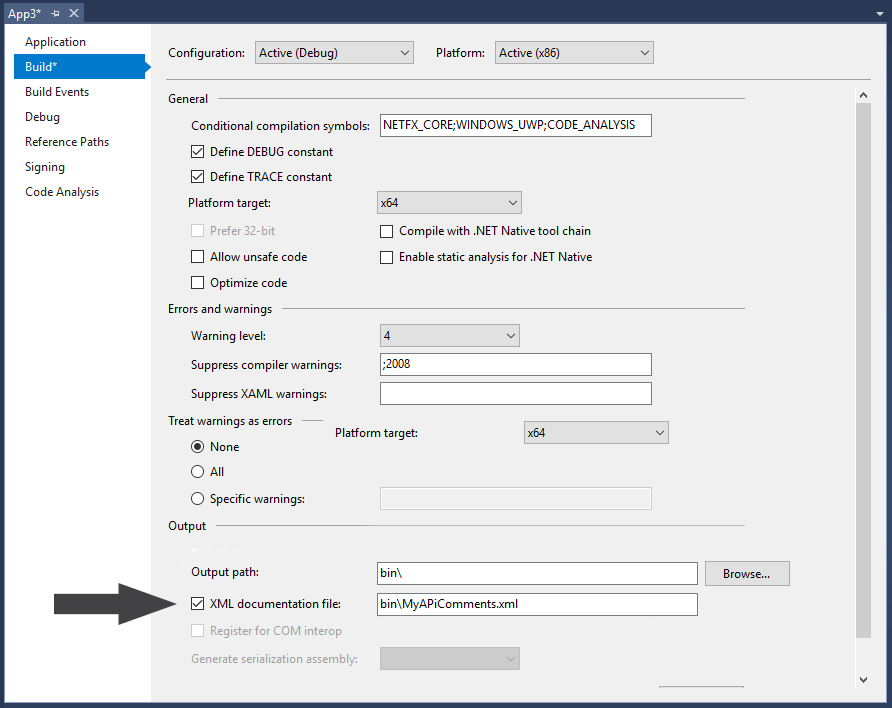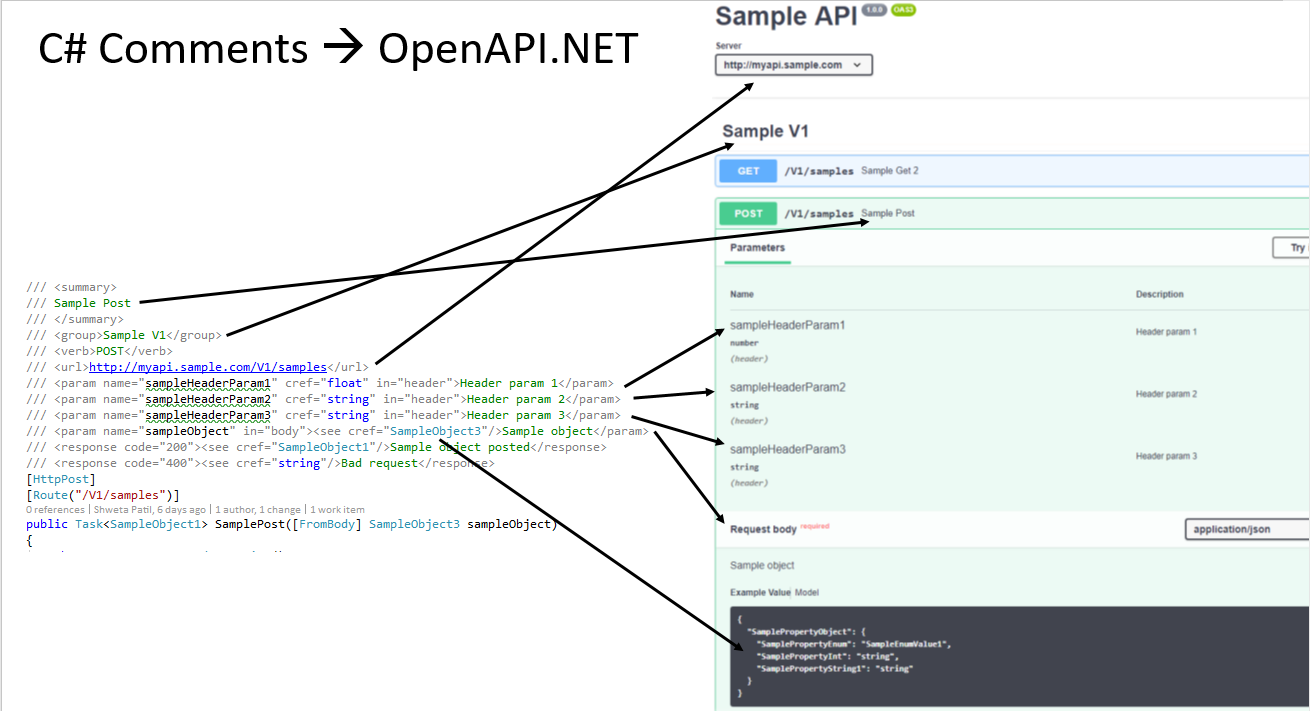microsoft / Openapi.net.csharpannotations
Programming Languages
Labels
Projects that are alternatives of or similar to Openapi.net.csharpannotations
Convert C# Annotations to OpenAPI.NET [Preview]
[Disclaimer: This repository is in a preview state. Expect to see some iterating as we work towards the final release candidate slated for January 2019. Feedback is welcome!]
Welcome!
This component is the first by-product of Microsoft's supported base OpenAPI.NET object model. The module is designed to convert your native annotation XML from your API code into a OpenAPI document object. All you need to do is follow a simple annotation schema for your API controller comments, and you automatically get all the benefits of the OpenAPI and its related Swagger tooling.
Overview
We've made an effort to develop an annotation model that maps very closely to the native .NET comment structure for the C# language. In general, the below image describes the general concept of how this utility can translate your annotation XML to an OpenAPI.NET document.
Consult our Wiki for specific guidance and examples on how to annotate your controllers.
Remarks: Throughout the README and the Wiki, we will use the following terminology:
C# Comments refers to the comments in the code
/// <summary>
/// Sample Get 1
/// </summary>
/// <group>Sample V1</group>
/// <verb>GET</verb>
/// <url>http://localhost:9000/V1/samples/{id}?queryBool={queryBool}</url>
/// <param name="sampleHeaderParam1" cref="float" in="header">Header param 1</param>
/// <param name="id" cref="string" in="path">The object id</param>
/// <param name="queryBool" required="true" cref="bool" in="query">Sample query boolean</param>
/// <response code="200"><see cref="SampleObject1"/>Sample object retrieved</response>
/// <returns>The sample object 1</returns>
Annotation or Annotation XML refers to the compiler built version of the above comments
<member name="M:Microsoft.OpenApi.CSharpComment.Reader.Tests.SampleApis.Controllers.SampleControllerV1.SampleGet1(System.String,System.Boolean)">
<summary>
Sample Get 1
</summary>
<group>Sample V1</group>
<verb>GET</verb>
<url>http://localhost:9000/V1/samples/{id}?queryBool={queryBool}</url>
<param name="sampleHeaderParam1" cref="T:System.Object" in="header">Header param 1</param>
<param name="id" cref="T:System.String" in="path">The object id</param>
<param name="queryBool" required="true" cref="T:System.Boolean" in="query">Sample query boolean</param>
<response code="200"><see cref="T:Microsoft.OpenApi.CSharpComment.Reader.Tests.Contracts.SampleObject1"/>Sample object retrieved</response>
<returns>The sample object 1</returns>
</member>
This Document Generator consumes the above annotations (outputted from MSBuild.exe) to create OpenAPI.NET objects.
Mechanics
The following items are needed as input to the Document Generator:
- Paths to the Annotation XML documentation files from your MSBuild.exe output. (
List<string>) - Paths to the Assemblies (DLLs or EXEs) that contain the data types referenced in the comments. (
List<string>) - Version of the OpenAPI document. (
string) Note this is not the OpenAPI specification version. This corresponds to the version field of the Info object in an OpenAPI document. - Version of the filter set (
FilterSetVersionenum)
After you've correctly annotated your C# code, you'll need to build your solution and then retrieve the output annotation XML file where MSBuild.exe aggregates the projects comments. This file is what this utility will use to convert your comments into an OpenAPI.NET object.

Simple Example Code
Here's a simple example. The OpenApiGeneratorConfig class is instantited with two lists, the document version, and the filter set version. The first list contains the paths to your Annotation XML documentation files. The second list contains the paths to the assemblies where classes referenced in the C# XML comments can be found.
For example, if you have a C# comment for a response type as follows:
/// <response code="200"><see cref="SampleObject1"/>Sample object retrieved</response>
You will need to include the path to the assembly file that contains the SampleObject1 class.
Generating your OpenAPI.NET document should look something like this:
var input = new OpenApiGeneratorConfig(
annotationXmlDocuments: new List<XDocument>()
{
XDocument.Load(@"C:\TestData\Annotation.xml"),
XDocument.Load(@"C:\TestData\Contracts.xml"),
},
assemblyPaths: new List<string>()
{
@"C:\TestData\Service.dll",
@"C:\TestData\Contract.dll"
},
openApiDocumentVersion: "V1",
filterSetVersion: FilterSetVersion.V1
);
GenerationDiagnostic result;
var generator = new OpenApiGenerator();
IDictionary<DocumentVariantInfo,OpenApiDocument> openApiDocuments = generator.GenerateDocuments(
openApiGeneratorConfig: input,
generationDiagnostic: out result
);
In this example, the generated openApiDocuments should contain valid OpenAPI.NET document(s) for your API based on the provided annotation XMLs and contract assemblies.
Newtonsoft (JSON.NET)
C# Document Generator supports fetching Newtonsoft.Json JsonProperty and JsonIgnore attributes. If your service contracts use Newtonsoft, you will have to include the same version of Newtonsoft.Json.dll as used by service contracts in the assembly paths.
Optional Advanced Configuration
Document generator also allows you to provide an optional advanced configuration as input in OpenApiGeneratorConfig.AdvancedConfigurationXmlDocument
which enables:
- Specifying annotations that logically apply to either the entire document or certain sets of operations.
- Generating multiple documents based on the provided variant information.
The configuration XML is handcrafted (NOT generated from Visual Studio build).
Consult our Wiki for specific guidance and examples on how to draft this XML.
VSTS Build Task
Nuget Packages
Contributing
This project welcomes contributions and suggestions. Most contributions require you to agree to a Contributor License Agreement (CLA) declaring that you have the right to, and actually do, grant us the rights to use your contribution. For details, visit https://cla.microsoft.com.
When you submit a pull request, a CLA-bot will automatically determine whether you need to provide a CLA and decorate the PR appropriately (e.g., label, comment). Simply follow the instructions provided by the bot. You will only need to do this once across all repos using our CLA.
This project has adopted the Microsoft Open Source Code of Conduct. For more information see the Code of Conduct FAQ or contact [email protected] with any additional questions or comments.


